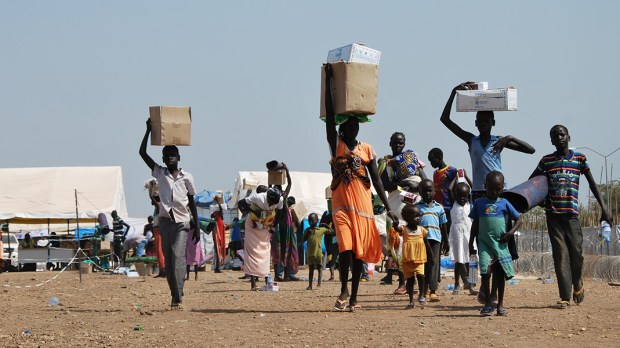Lenten Campaign 2025
This content is free of charge, as are all our articles.
Support us with a donation that is tax-deductible and enable us to continue to reach millions of readers.
The Catholic Church is observing October 2019 as an Extraordinary Missionary Month. The missionary work of the Church is often performed under difficult conditions: in the midst of persecution, poverty and war. This is also true for South Sudan.
Hundreds of thousands of casualties, millions of refugees—South Sudan has been left in a desolate state by the civil war that broke out in 2013, at a time when the African country was only in its second year, and which lasted until the cease-fire last year. This is how the situation was described by Father Boniface Isenge in an interview with Aid to the Church in Need (ACN).
According to Father Boniface, about 38 percent of the approximately 13 million South Sudanese are Christian. About 180,000 Catholics live in his diocese. He said that many even consider the Catholic Church to be the only functioning institution in the country. As a young priest, the Spiritan first lived in neighboring Ethiopia for eight years before he decided to go to South Sudan in 2013.
“After the country gained independence, my order was urgently looking for priests and missionaries to work here. I wanted to do something new and was ready for this new mission,” Father Boniface recalled. He sees it as his calling to bring peace to this war-torn region.
Almost immediately upon his arrival, the priest discovered that his parishioners were longing for education. “In some cases, the schools in South Sudan are located quite far apart,” he deplored. “They are overcrowded: in general, there are 60 pupils in each class and sometimes more than 100 people have to be taught in the same room.”
According to official statistics, about three quarters of all inhabitants of South Sudan over 15 years of age are illiterate. The priest soon realized that “education is the key to eliminating the recurring tensions in the populace. Education will bring peace!”
Accordingly, in addition to pastoral care, Father Boniface focuses his work on communicating to parents the importance of education for their children. Not only so that the prospects of the children are better than those of the generation before them—in spite of the wretched state and problems facing the country—but also to strengthen young people’s independence.
“Seventeen per cent of all marriages involve underage girls. Unfortunately, that continues to be common practice here,” the priest said.
Even though South Sudan is the third poorest country in the world, prices of basic goods are comparatively high. “Many are not even able to afford the most basic foods and are reliant upon aid and support,” says Father Boniface. The country is saddled by even more problems, like many diseases, such as malaria.
However, in spite of so much adversity, Father Boniface remains confident. He says: “My heartfelt thanks to all who support us and are close to us in prayer. I very much hope that, in the future, it will be possible to lead a good life in South Sudan.”
Since 2015, the year South Sudan became independent, ACN has granted more than $3.4M in aid to the Church in South Sudan for such projects as the rebuilding of churches and pastoral facilities, priestly formation and Mass stipends. This article first appeared at ACN’s website and printed here with kind permission.

